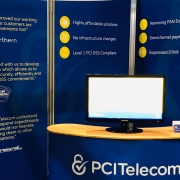From the very beginning, we knew that there was a gap in the market to offer small and medium sized businesses a solution to their card payment processing needs that would at the same time address their PCI DSS compliance obligations. Having just celebrated our second birthday, we thought we’d take the time to look back over what we’ve achieved so far.
We’ve been lucky enough to have worked with a variety of businesses since we started, from retailers and e-commerce sites to rail operators and visitor attractions. Below are two examples of client projects that we are proud to have developed and implemented.
Museum of London
The Museum of London chose us as their preferred supplier to address concerns relating to their PCI DSS compliance, specifically with over-the-phone payments being made to a live operator. After meeting to discuss their requirements, we created and installed a hosted PCI DSS Level 1 accredited DTMF suppression solution (our PCI Agent™) that enables callers to input their card details securely via their telephone keypad without the need to temporarily cut off the agent. The system included a new dedicated Box Office sales line and full interaction with telephone systems on both inbound & outbound calls.
In addition, we introduced a unique email receipt functionality for the museum along with an inbound IVR solution that distributes calls to Box Office agents and other departments. Call reporting and card logs were integrated into the agents’ on-screen portal within PCI Agent™ allowing for quick transfer, searches and refunds to take place during a call. This new system means that not only have they addressed their PCI DSS compliance concerns, their callers reach the right department quickly and efficiently, improving the customer experience as well as staff productivity.
Adam Monnery, Head of ICT at The Museum of London said: ‘The PCI Telecom team were proactive from the moment we contacted them. Unlike many other PCI DSS suppliers, who focus solely on large corporates, PCI Telecom were happy to meet with us and discuss our needs. They were keen to work with us to develop a bespoke solution which allows us to process payments securely, efficiently and meeting our PCI DSS commitments. Their after-sales service is also second to none as they are easy to get hold of and proactive in solving problems in a timely manner.’
Merseyrail
Train operator, Merseyrail, responsible for carrying 36 million passengers every year around Liverpool and its environs, were looking to introduce easier payment options for passengers that had received penalty notices. They needed a solution that could be installed at ticket offices, that was easy for staff to use and that could integrate with processes already in place.
Having listened to their requirements, we introduced a bespoke hosted IVR solution encompassing all their existing telephone systems. Merseyrail passengers can now call a single number to speak to customer services, the prosecutions department and passenger assistance as well as automatically pay the balance of their penalty fare notice, car parking fine or out of court settlement. All calls to operators are recorded for monitoring and training purposes (including outbound calls) and all payments can be processed in a fully PCI DSS compliant manner with Level 1 accreditation. We also introduced a web payment facility with the highest level of security for passengers. Both payment channels integrate directly with the associated Merseyrail databases to provide real-time reports on outstanding penalty notices and car parking fines.
Steve Sheils, Head of Revenue Protection at Merseyrail said: ‘We have been using the PCI Telecom solution for almost 12 months and have been extremely happy with the results. Our web payments are now fully secure and our telephone system routes calls to the appropriate person/department and manages calls out of hours with an auto-responder; something we never had before.
We have seen an improved customer experience especially during periods of train service disruption. The automatic payment line and web payment site automatically links to our systems affording the customer a seamless process for making payments. Dropped calls have significantly decreased and the reporting capability is second to none. The team at PCI Telecom understand our business and respond expeditiously to any issues.’
Could we do the same for your business?
The world of PCI DSS compliance can be confusing and sometimes intimidating. While the larger providers offer off-the-shelf solutions primarily to suit big companies, at PCI Telecom our approach has always been to simplify the process and deliver bespoke over-the-phone and online card payment processing solutions that meet the specific needs of every business we work with and ensure that PCI DSS compliance is achieved.
Whether you’re looking to replace an entire payment system or if there is just a small gap in your card processing or PCI DSS compliance that needs plugging, we’d be happy to help. Visit our Solutions page to find out more about what we offer or alternatively, get in touch here. We are looking forward to seeing what the next two years bring our way.



















